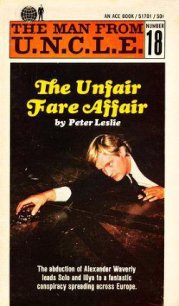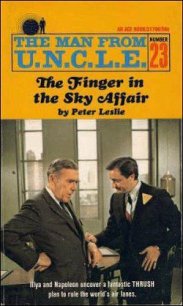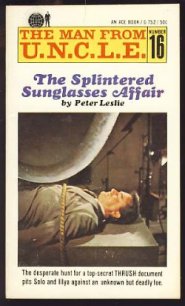The Radioactive Camel Affair - Leslie Peter (е книги txt) 📗
He rode on down the track—now clearly marked and in greater use than much of the route over which he had traveled.
He was within sight of the open space where he had seen the caravan when he suddenly noticed that the bleeps on the homer were growing fainter. Puzzled, he stopped. He knew the train had come this way because he had watched it; and he knew, furthermore, that the camel had still been with it then. They couldn’t possibly have accelerated and got so far ahead that they were out of range. Why should the signal have lost strength if he was—as he knew—on the right track? He rode on further—and the bleeps grew fainter still.
Had the beast carrying the canister broken away from the main body, then? He halted again and swung the homer questioningly around. There was no sign of the signal strengthening in any direction tangential to the trail. It was only when he wheeled completely about that he realized.
The bleeps increased in volume when he was facing back the way he had come.
Although the camel was still with the caravan, the canister—or at least the homing device he had placed with it—had been left somewhere along the route. Solo cantered back along the track, his pulses quickening with the thought of action at last.
It was a simple matter to follow the signals. They grew stronger and stronger as he went along. It looked as though the canister was now stationary.
The homer finally led him off the track and in among the woods. When the signals were registering their maximum, he dismounted, drew the Mauser, and tiptoed cautiously through the undergrowth as the device directed him. There was a puzzled frown on his face: he must be almost there, yet there were no signs of buildings or installations such as he had expected. At length he came to a small clearing with a sandy pit in the middle.
In the center of the pit was the lead canister. It was open, Solo saw with a momentary surge of alarm…but the narrow core in the heart of the lead shield was empty.
Except for the homer placed neatly in the middle of it.
“You had better drop the pistol,” a voice said quietly in Arabic. “There are automatic rifles covering you from all around.”
Solo whirled. Among the tree trunks enclosing the glade, a ring of soldiers with rifles at the hip stood in the shadows. He pitched the Mauser away from him and stood waiting.
A squat, powerfully built African wearing a French paratroop beret and the insignia of a colonel on the shoulder-straps of his bush shirt stepped forward and picked the gun up.
“We thought you would turn up to collect your little toy,” he said affably. “What kept you so long?—We have been waiting for you.”
Chapter 12
A Surprise for Illya
ILLYA KURYAKIN MARCHED the whole of the next day with Rosa Harsch and her retinue. He was in an awkward predicament, for the woman herself continued to be deliberately evasive about her destination, and he could not decide at what point he should break away and head off on his own. Since, for the moment, the expedition appeared to be following the route he would himself have chosen, he stayed with them.
The forest grew denser and steamier. The hills became higher. And when again they stopped to make camp for the night, he estimated that they must be on a level with Halakaz but about twenty miles to the east.
While the enigmatic Miss Harsch was issuing instructions to Mustapha on the siting of tents, the young, bearded man who had been beaten the previous evening maneuvered himself close to Kuryakin. “I don’t know who you are,” he said, “but if you are trying to make your way to Gabotomi, it lies no more than ten or twelve miles due northeast of here.”
“I don’t know who you are,” the Russian replied, “but thank you. The information will be of great use to me. Do you know the place yourself?”
‘“We have been…near there. We have looked down upon it. But it is necessary to proceed with extreme caution: the town—it was originally only a settlement—is tucked away at the bottom of a steep gorge. It is impossible to descend the cliffs at either side and behind it. The only entrance is along a steep valley leading directly to the gate—and that is too well guarded to force. The place is the headquarters of the Nya Nyerere. There are hundreds of their soldiers there, and there seems to be assault courses, training grounds, lecture theaters—the full equipment of a military academy.”
“I don’t know why you should tell me all this—”
“It is necessary to make a stand against autocracy at times,” the young man said vaguely. He had a thick central European accent.
“Ah. The punishments? I confess that I was surprised to find you made no protests.”
“Orders. Besides, it was part of the deal when we signed on; it was made clear that infringements would be punished and we agreed to accept those punishments if they were merited—all of us. Also, the money is very good…Nevertheless, one’s self-respect demands a gesture from time to time…I must go: it would not do for me to be seen talking to you for too long.” And he glided unobtrusively away.
Illya took his leave as soon as they struck camp the following morning, telling Rosa Harsch that he expected to find his partner some way east or southeast of their present position. She took his hand in a firm grip as they said their farewells—and seemed reluctant to let it go. “I wish you luck, my friend” she said huskily. “And I ask you to take care. If you have need of help, come back to us; we shall be taking readings for several days about twenty miles north of here. Anyway, I have a feeling that we shall meet again, you and I.” She stared full into his eyes for a moment and then, abruptly releasing his hand, turned and creaked off down the trail after her bearers, the switch of blonde hair with its black bow bouncing up and down on her muscular shoulders.
Kuryakin made his way due east for about half a mile along a side trail, in case he was being watched, and then plunged into the forest in the direction indicated by the young man with the beard. Half an hour’s hard going brought him to another narrow track running roughly the right way, and for the next two hours he made good time. By noon he was wedged into a tree fork, binoculars to his eyes, looking down on the roof-tops of Gabotomi from a ridge above and behind the ravine in which the place was built.
It certainly did look like an army camp. Between the geometrically arranged buildings—constructed, astonishingly, of red brick in the European style—there was a constant coming and going of squads of men, most of them Negroes and all of them in uniform. He could distinguish a parade ground with platoons drilling, a carefully laid out battle course, and several groups seated cross-legged on the ground listening to open-air lectures complete with blackboards and lantern slides. From far below, the crackle of rifle fire drifted up from a line of butts just outside the settlement.
If—as seemed probable from the hints dropped by Mazzari and Ononu—the Nya Nyerere was in some way being aided by Thrush, this was obviously the place where it was being done. But why? What was in it for Thrush? How could the overthrow of the Sudanese government in the north aid the evil organization’s plans for world conquest?
Illya’s biggest surprise was still to come, however. And it was not until he turned his back on Gabotomi that he received it. He had maneuvered himself around in the tree fork and was sweeping the scores of miles of wooded hills to the east with his glasses when suddenly he gave an exclamation of amazement. For a moment he had thought…Yes! There it was again! In the magnified circle of terrain revealed by the lenses, a section of modem, metaled highway ran…




![[The Girl From UNCLE 04] - The Cornish Pixie Affair - Leslie Peter (электронная книга .txt) 📗](/uploads/posts/books/56865/56865.jpg)